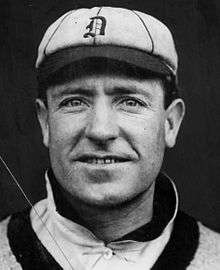Charley O'Leary
| Charley O'Leary | |||
|---|---|---|---|
 O'Leary with the Detroit Tigers | |||
| Shortstop / Coach | |||
|
Born: October 15, 1875 Chicago, Illinois | |||
|
Died: January 6, 1941 (aged 65) Chicago, Illinois | |||
| |||
| MLB debut | |||
| April 14, 1904, for the Detroit Tigers | |||
| Last MLB appearance | |||
| September 30, 1934, for the St. Louis Browns | |||
| MLB statistics | |||
| Batting average | .226 | ||
| Home runs | 3 | ||
| Runs batted in | 213 | ||
| Teams | |||
|
As a player As a coach | |||
| Career highlights and awards | |||
| |||
Charles Timothy O'Leary (October 15, 1875 – January 6, 1941) was an American professional baseball shortstop who played eleven seasons with the Detroit Tigers (1904–1912), St. Louis Cardinals (1913), and St. Louis Browns (1934) of Major League Baseball (MLB).[1]
Early life
Born in Chicago, Illinois into a family of 16 children (11 boys), O'Leary worked at age 16 for a clothing company and played on the company's semi-pro baseball team. His talent as a middle infielder and scrappy hitter came to the attention of Charles Comiskey, owner of the Chicago White Sox. Though there is no independent verification, O'Leary reportedly signed briefly with the White Sox,[2] only to have his arm broken from a pitched ball thrown by 'fireballer' and Hall of Famer, Rube Waddell.[3]
Major Leagues
O'Leary major league debut was on April 14, 1904 with the Tigers. He was Detroit's starting shortstop from 1904–1907 and became a backup shortstop and utility infielder from 1908-1912.[1]
In the off-season, O'Leary and teammate Germany Schaefer, known as one of baseball's zaniest characters, worked as a comic vaudeville act.[4] The O'Leary-Schaefer vaudeville act is said to have inspired two Metro-Goldwyn-Mayer musicals: the forgotten 1930 film They Learned About Women, featuring the noted vaudeville act Van and Schenck, and Busby Berkeley's last film, Take Me Out to the Ballgame (1949), with Gene Kelly and Frank Sinatra.
Not known for his hitting, O'Leary had a career batting average of .226.[1]
After finishing his playing career in 1913 with the St. Louis Cardinals, O'Leary was a player-manager in the minor and semi-pro leagues for several years, including in San Francisco, St. Paul, San Antonio, and Chicago,[2] until he was offered a coaching job in 1920 by his close friend, Miller Huggins, manager of the New York Yankees.[5] After a 17-0 victory over the Washington Senators on July 6, 1920,[6] O'Leary was returning to New York in a car driven by Babe Ruth, along with Ruth's wife Helen, rookie outfielder Frank Gleich, and second-string catcher Fred Hofmann. Ruth lost control of the car, and O'Leary was ejected from the vehicle, although he suffered only minor injuries.[7] He coached for the Yankees for 10 years, during which they won six pennants and two World Series, including the great 1927 Yankees team.[2] O'Leary then coached with the Chicago Cubs under Rogers Hornsby, and with the St. Louis Browns.
On September 30, 1934, several weeks shy of his 59th birthday, O'Leary was called out of retirement by the Browns. In a pinch-hitting appearance, he singled and scored, becoming both the oldest Major League Baseball player to collect a hit and to score a run.
Date of birth
During his career, O'Leary claimed to have been born in 1882. However, in 2010, a researcher for the Society for American Baseball Research found him in the 1880 census. His draft record for World War I, which showed that he was born in 1875, was subsequently located. This made him the second oldest major league baseball player to appear in a game, after Satchel Paige.
References
- 1 2 3 "Charley O'Leary". baseball-reference.com. Baseball-reference.com. Retrieved 29 April 2016.
- 1 2 3 Kieran, John (August 25, 1931). "Sports of the Times - The Saga of Charley O'Leary". The New York Times. p. 26. Retrieved 29 April 2016.
- ↑ "Start of Charley O'Leary - Was Messenger Boy of 17 When He Broke Into Fast Company - Now With Indianapolis". St. Petersburg Daily Times. June 23, 1912. p. 5. Retrieved 29 April 2016.
- ↑ Holmes, Dan. "Germany Schaefer". sabr.org/. Society for American Baseball Research. Retrieved 29 April 2016.
- ↑ "Huggins Signs New Coach". The New York Times. February 12, 1920. p. 13. Retrieved 29 April 2016.
- ↑ "July 6, 1920 - Yankees at Senators Box Score and Play by Play". baseball-reference.com. Baseball-reference.com. Retrieved 29 April 2016.
- ↑ Pagano, Rich (January 13, 2014). "Sports Flashback: Babe Ruth and the Delco Connection". Delaware County News Network. Digital First Media. Retrieved 29 April 2016.